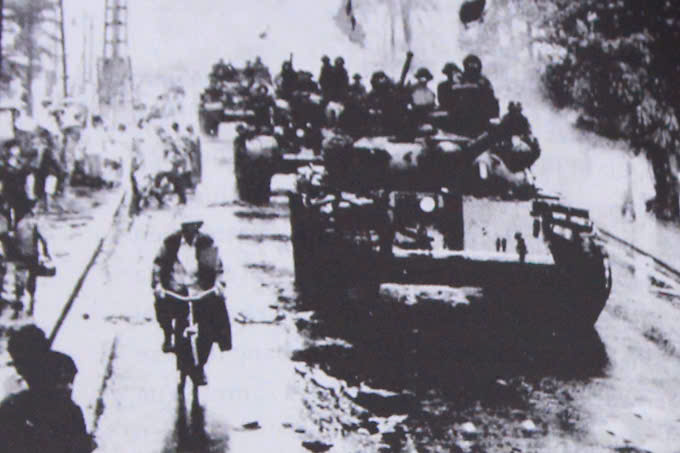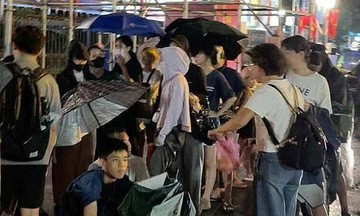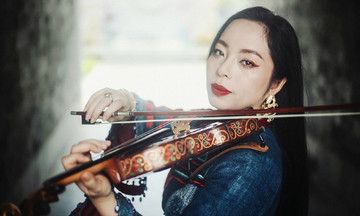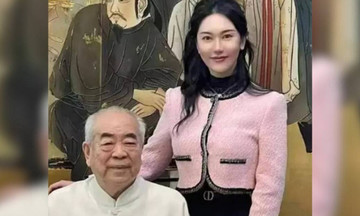For over 50 years, "Five Brothers on a Tank" (music by Doan Nho, lyrics by Huu Thinh) has been considered one of the most enduring revolutionary songs. During national celebrations and veteran reunions, the song resonates, evoking memories of a heroic wartime era. Generations born in the 1970s and 1980s often sing it together at gatherings, symbolizing unity. Recently, Gen Z has embraced the song thanks to modern remixes.
At a concert in April, entertainers Jun Pham and BB Tran sang the song with fans. On 10/8, the medley of "Five Brothers on a Tank" and "Tien Ve Sai Gon" at the "To Quoc Trong Tim" concert evoked strong emotions in the audience. In the new arrangement, the song begins acapella, then builds to a powerful, rousing rhythm. Tens of thousands of audience members sang along: "Five brothers on a tank. Like five flowers blooming from the same root. Like five fingers on one hand. The five charged into battle as one."
Poet Huu Thinh wrote the piece in 1971 while working as a propaganda assistant for the Armored Corps. During the Route 9 - Southern Laos campaign, he was tasked with reporting from the battlefield, also managing a film projection and narration team. One afternoon, he visited Company 6, Battalion 397, to prepare for a poetry reading that evening. He ate with his close friend’s unit, platoon leader Le Duc Tuan. When Tuan called out, "Anyone with canned meat, bring it all down here", the poet witnessed five soldiers climb onto a T-34 tank to retrieve food for their guests.
This image deeply impacted Huu Thinh. Verses began to form, starting with "Five brothers on a tank." He likened the soldiers’ bond to familiar images: "five flowers blooming from the same root," "five fingers on one hand." From strangers, they became unified by their shared goal of defending their country: "Starting the engine, a spirit of attack/ Facing the enemy, only knowing to advance." Beyond shared purpose, they were also kindred spirits, sharing joys and sorrows.
 |
Liberation Army tanks enter Da Nang. Photo: "Tanks in the Vietnam War" book |
Huu Thinh titled the work "On a Tank," using the pen name Vu Huu. Published in Nhan Dan newspaper, it quickly resonated with soldiers and civilians. The authentic, emotional verses touched many hearts, including composer Doan Nho. As a military musician, anything related to soldiers deeply moved him. In 1972, upon reading the poem, he was inspired to compose the music in a single morning. He incorporated folk music elements from Nghe Tinh province, with rhythms driving a fighting spirit.
* The poem "On a Tank"
Doan Nho recalls the song's first broadcast on a Voice of Vietnam program hosted by the late musician Thanh Phuc. Unable to recall the title, Thanh Phuc read the first line. Since then, generations have known the song as "Five Brothers on a Tank." The song is closely associated with People's Artist Quang Tho, whose performance captured the era's spirit, honoring the soldiers' unity and resolve.
Last year, while donating his materials to the National Archives Center III, Doan Nho mentioned how many people misquote the lyrics. The line "The habit remains, each person eats with a different personality" is often sung as "The habit remains in him, each person with a different personality." Some also question the lyric-music alignment in Doan Nho's change from "Five hearts beating together urgently" to "Five hearts beating together excitedly." According to Doan Nho, this served the melody, while "beating urgently" reflected the wartime context. Huu Thinh supported this change to enhance the music's emotional impact.
Huu Thinh, 83, graduated from the first class of the Nguyen Du Writing School. He served on the Vietnam Writers' Association Executive Committee from the third to the eighth congress, as Chairman for four consecutive terms (2000-2020). He was also a National Assembly delegate (10th and 11th congresses) and Chairman of the Vietnam Literature and Arts Associations. He writes poetry, essays, and critical reviews, but his greatest success lies in nearly 20 poetry collections. His most famous work, "Sang Thu," is taught in high school literature. His epic poems include "Road to the City" (1979), "Sea Epic" (1994), "Endurance of the Land" (2004), and "Tan Trao Moon" (2016).
Doan Nho, 92, joined the army in 1950 and is known for songs like "Song Cua Tung" (choral), "Marching Under the Military Flag," "The Girl from the La River" (lyrics by Phuong Thuy), and "Chiec Khan Pieu." Besides vocal music, he has written musical dramas and orchestral pieces like Symphony No. 1 "Historic August" and Symphony No. 2 "Thanh Giong." His career also includes numerous essays and music critiques. In the early 1980s, he received a Doctorate in Music Theory from the Kiev Conservatory in the former Soviet Union. He was awarded the State Prize for Literature and Arts (2001) and the Ho Chi Minh Prize for Literature and Arts (2017).
Phuong Linh











